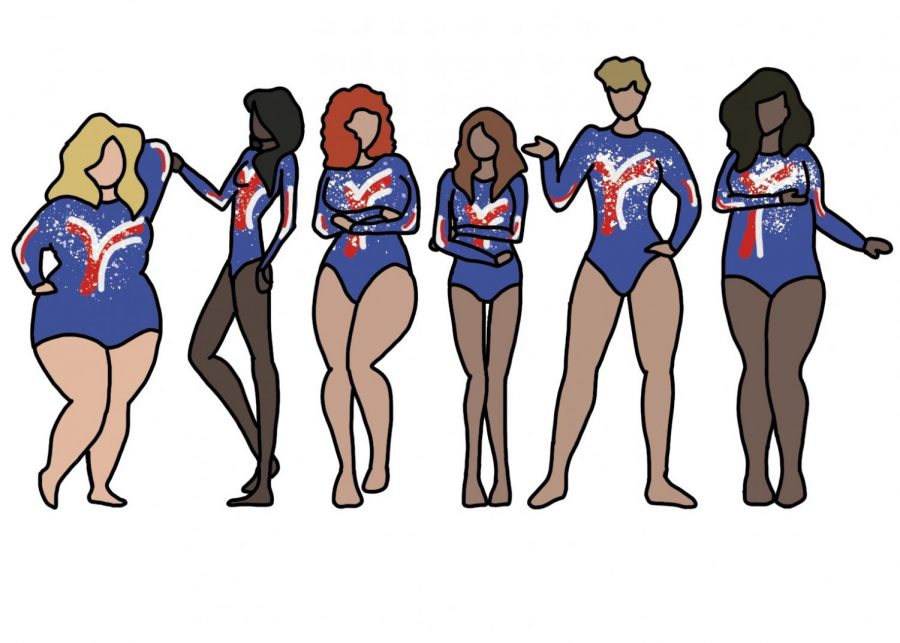How Young Gymnasts Are Pressured To Conform To Impossible Beauty Standards
Young gymnasts often face pressures to look or act a different way.
October 29, 2021
Gymnastics is a sport where young people are judged solely on their bodies. While they flip and turn, the lines their bodies make are constantly evaluated and criticized. Certain body types are praised over others, leading to issues of favoritism and unequal opportunity that have plagued the sport for years.
Senior Varsity Creek gymnast Brooke Bennett cannot remember a time when there wasn’t favoritism because of body types.
“I’m not the shortest gymnast on the team, and I definitely notice the shorter girls getting more attention and sometimes even higher scores,” Bennett said. “It’s kinda just always been that way.”
Gymnasts often experience criticism on aspects of their bodies that cannot be changed. Many coaches routinely criticize the athletes for their height, natural lines, or flexibility, and it can certainly take a toll mentally.
“It can be very frustrating,” Bennett said. “There’s definitely pressure to fit into an unachievable beauty standard.”
Many young gymnasts experience mental health issues – a concern that is only accentuated by the pressure placed on them to be perfect in all areas of the sport, especially their body. Criticism of young people’s bodies can be especially dangerous because of the commonality of eating disorders in gymnastics. A 2019 NCAA report found that upwards of 51% of gymnasts experience disordered eating, which is likely a result of the pressure they feel from coaches to be lean and “presentable.”
“Our coaches make comments about our bodies all the time, whether it’s telling us to shave our legs, or that we’re not flexible enough, or that girls are too tall,’’ sophomore club gymnast Shayna Thighe said. “It’s really damaging to your mental health to feel like you can never make any mistakes.”
Many gymnasts, including Thighe, consider quitting because of the immense burden and stress placed on them by the sport.
“I’ve always loved gymnastics, but lately it’s just been so toxic for my mental health and I don’t really love it as much anymore,” Thighe said.
Pressure to have a certain body and appear perfect starts at a young age. Gymnasts are taught very early that they need to look lean and strong with very little body fat. Senior Creek Gymnast Zoe Purcell recalls having a band wrapped around her stomach when she was young in order to teach the gymnasts to hold in their stomachs constantly. “I basically grew up feeling like I had to be perfect all the time,” said Purcell. “It was literally so toxic.”
Lately, however, the emphasis on having a specific body type and the disregard of mental health in the sport is shifting thanks to gymnasts in the public light.
Olympic champion Simone Biles stands at only 4’8 with a muscular, stocky figure and is in possession of seven Olympic medals.
“You look at gymnasts back in the day and they’re all skinny and tall, but not Simone Biles,” Thighe said. “She’s one of the greatest athletes in the world and no one cares about her body type.”
Biles withdrew from the vault and uneven bars events in the Tokyo Games. Her decision to prioritize mental health was met with widespread support from fans and USA Gymnastics.
In a statement on Biles, USA Gymnastics said, “We wholeheartedly support Simone’s decision and applaud her bravery in prioritizing her well-being. Her courage shows, yet again, why she is a role model for so many.”
Biles’s presence has challenged the idealistic beauty standards of the sport, as well as increased mental health awareness among athletes. Many gymnasts, including Thighe, are hoping for the tides to turn on unfair standards in their sport.
“It’s definitely changing.”
This article won Third Place In-Depth Sports Coverage from CSMA.























